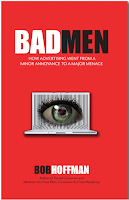Medical practitioners, who were trained in the practice of bloodletting, never questioned its efficacy. They just assumed it worked because they were taught it worked and they credulously attributed the fact that some people got well to the treatment.
We are faced with a similar problem today in advertising. We have a whole generation of people who have been taught nonsense. They are now in important positions in marketing and advertising, and they are practicing what they have been taught.
For almost 20 years, advertising programs, marketing courses, and professional development classes have taught these people principles that can now be labeled either seriously flawed or outright baloney. Some of them are:
- Consumers want to interact with advertising.
- The "interruption" model is dead, and the "permission" model is transcendent.
- Consumers want to have "relationships" with brands and be "engaged" with them.
- Consumers are heavily influenced by online "conversations about brands."
- Broadcast media are "dead."
Marketing and advertising have always had their share of questionable beliefs. But never before in my experience has a whole generation of marketing and advertising people been taught an entire set of principles that is so lacking in a factual basis, and so influenced by anecdotes and fantasies.
Paradoxically, a generation that has been raised to worship data, is ignorant of the data that has evolved to demonstrate the fundamental fallacies of these principles.
Worse, they dismiss those of us who question their "bloodletting" as ignorant heretics.
Wonderful cartoon is from Tom Fishburne
Hat tip to Steve Goldstein






9 comments:
Maybe it's a simple as extinction. An adult solution. It's up to both the marketers and agency principals to eliminate behavioral reinforcements (hiring, promotions, junkets) or to introduce extinction stimuli (judgment, shame) to these juvinile junk merchants.
toiletpaper and toothpaste? No. Never.
But Tesla? Sure, I'll interact with them.
Some brands are interesting enough for me to have a "relationship" with.
Seems like those brands would lose out a bit if they followed your advice.
Weirdly, your blog is the only advertising soapbox I follow or interact with.
It's almost like they're embarrassed to work in advertising and admit they sell things for a living. I'm convinced some people are paid each time they use the word "engagement". And... here's the WTF moment in a meeting I'll never forget, "It can't look like an ad. Make it look like a music video. I don't want them knowing what it's about".
Exactly, Russell. There's no shame in selling goods and services to other people--well, maybe if you're peddling cigarettes.
Maybe all these new age marketers who grew up in the everybody-gets-a-trophy and "we don't keep score" world are scared of the moment of truth? When the prospective customer decides what to buy (or not) not everybody gets a trophy. Most, in fact, go home empty-handed. Avoiding the ask by "engaging" delays the very real probability that you come in second.
I think I know how to kill two highly questionable marketing
beliefs “…lacking in factual basis…”.
I just read a piece on how something called “the internet of things” might alter how many (not all) consumer product brands could be created and developed. Simply put, the Internet of things is a world in which impossibly f#$%ing small, impossibly f#$%ing cheap and impossibly f#$%ing flexible real world sensors are almost f#$%ing everywhere.
OK – I’m hip to the inherent creepiness factor involved in Big Brother being able to monitor, store and examine all the information hundreds of billions of sensors can create. But I’m asking you to be willing to suspend that Orwellian neurosis for a moment and hear me out.
Having access to real world information about how your brand’s products and consumers are used and behave, releases us from at least two things that are enfeebling brand managers today: algorithms and self-reported consumer behavior.
Algorithms are at the core of most assertions about how effective digital, and especially social media platforms can be. But that are not the real world. They are a mostly hypothetical intellectual model of how things work in the environment we can all see and touch. Sure, they are also
used to project the effectiveness of more traditional media as well, but they have had the advantage of being refined over many decades to better represent what is happening in the real world. The point is that algorithms are a theoretical forecast of human behavior and sensor generated information is a direct result of human behavior.
Sensors hold the same advantage over self-reported consumer behavior. Very little consumer research is done by direct observation; like ethnographies. It’s just too damn expensive! In addition, social media encourages aggressively enhancing (lying about) self-reported behaviors to increase perceived social status. Encourage may be too weak. Lying may be the expected norm – like reporting your weight on a dating site. With ubiquitous sensors, more accurate consumer behaviors can be captured.
Anyway, real-world consumer information trumps the permission-interaction-engagement-behavior model with observable, recordable facts.
Of all the digital clowns, Matt Britton at MRY is the most inane, filling the world with his social-media-millenial-bullshit. Bob, I really think you should read his new book, just to see how much smoke comes out of your ears.
http://mattbritton.com/youthnation
Don't you love the hypocrisy of "consumers won't put up with advertising that tells them things" combined with "so we'll just bait & switch - make it look like it's not an ad then sucker them into engaging"... So honorable...So guaranteed to piss of the consumer.
I attended the Mobile Media Summit this week and an agency EVP sitting on a panel announced he works in what's formerly known as advertising. His goal isn't to win a Lion and an Effie; his goal is to win an Emmy for his digital content. I had to leave the room.
"After all, it's about being a human being…"
Says the VP of content-marketing AUTOMATION software?
Post a Comment